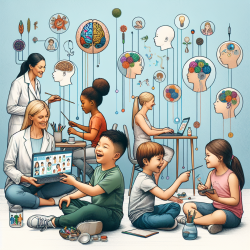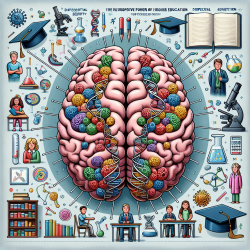Introduction
As practitioners dedicated to enhancing the lives of children, especially those facing significant health challenges, it is crucial to rely on data-driven insights and evidence-based practices. A recent study titled A Multi-Modal Family Peer Support-Based Program to Improve Quality of Life among Pediatric Brain Tumor Patients: A Mixed-Methods Pilot Study offers promising findings that can be leveraged to improve the quality of life (QoL) for pediatric brain tumor patients and their families.
Understanding the Study
The study explores a 12-week intervention known as the Ohana Project, which combines traditional Chinese medicine (TCM) and peer support to enhance the quality of life for pediatric brain tumor patients and their families. This mixed-methods pilot study involved group TCM sessions, a private Facebook support group, and weekly health behavior education and yoga for parents.
The results were promising, showing significant improvements in baseline emotional distress, health behaviors, and QoL measurements. The study demonstrated the feasibility and acceptability of a multimodal peer support-based intervention that included both in-person and online group interactions.
Key Takeaways for Practitioners
Here are some actionable insights for practitioners looking to improve their skills and outcomes for pediatric brain tumor patients:
- Incorporate Peer Support: Leveraging peer support can significantly reduce emotional distress and improve disease management. Consider integrating peer support mechanisms into your practice, whether in-person or online.
- Utilize Online Platforms: The study highlights the effectiveness of online platforms like Facebook for facilitating peer support. These platforms offer privacy, flexibility, and consistent interaction, which are crucial for sustained behavior change.
- Integrate Traditional Modalities: TCM modalities such as acupuncture and acupressure were shown to improve psychosocial and physical QoL. Integrating these practices can provide holistic support to patients and families.
- Focus on Preventive Health Behaviors: Encourage families to adopt preventive health behaviors such as healthy eating, physical activity, and stress management. These practices are essential for long-term health and QoL improvements.
Encouraging Further Research
The study underscores the need for further research into interventions that combine TCM and peer support, particularly for caregivers of pediatric brain tumor patients. As practitioners, staying informed and contributing to research can lead to innovative solutions and improved outcomes for patients.
Conclusion
The findings from this study provide a roadmap for practitioners aiming to enhance the quality of life for pediatric brain tumor patients. By integrating peer support, utilizing online platforms, and focusing on preventive health behaviors, practitioners can create impactful interventions that address the multidimensional needs of these families.
To read the original research paper, please follow this link: A Multi-Modal Family Peer Support-Based Program to Improve Quality of Life among Pediatric Brain Tumor Patients: A Mixed-Methods Pilot Study.










